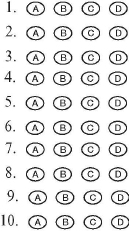
PART I

PART II
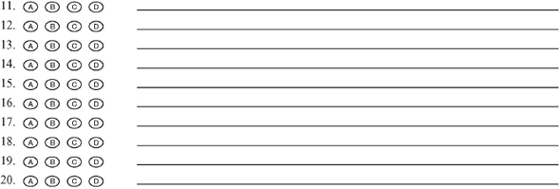
PART III
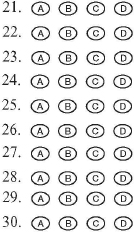
PART IV
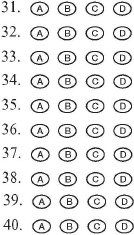
PART V
_______________________________________________________________________
_______________________________________________________________________
_______________________________________________________________________
_______________________________________________________________________
_______________________________________________________________________
_______________________________________________________________________
_______________________________________________________________________
_______________________________________________________________________
_______________________________________________________________________
_______________________________________________________________________
_______________________________________________________________________
_______________________________________________________________________
_______________________________________________________________________
_______________________________________________________________________
_______________________________________________________________________
_______________________________________________________________________
_______________________________________________________________________
_______________________________________________________________________
PART I
Select the best substitute for the underlined parts of the following ten sentences. The first answer [choice A] is identical to the original sentence. If you think the original sentence is best, then choose A as your answer.
1. Skating past the last defender, my father saw me score the game-winning goal.
A. my father saw me score
B. my father saw me having scored
C. I scored
D. I was scoring
2. Possession of a handgun without a permit is illegal in many states.
A. Possession of a handgun without a permit
B. When you possess a handgun without a permit, it
C. Possessing a handgun without a permit, this
D. When you possess of a handgun without a permit
3. I can run faster than my brother, even though he is three years older than me.
A. years older than me.
B. years older than I.
C. years’ older than I.
D. years’ older than myself.
4. Despite my lingering fears, my son got my permission to drive the day he earned his driver’s license.
A. my son got my permission to drive the day he earned his driver’s license.
B. my son was permitted to drive on the day he earned his driver’s license.
C. I permitted my son to drive my car the day he earned his driver’s license.
D. on the day my son earned his driver’s license, I permitted him to drive my car.
5. The prosecuting attorney asked the witness “Where were you on the night the crime was committed”?
A. witness “Where were you on the night the crime was committed”?
B. witness, “Where were you on the night the crime was committed?”
C. witness. “Where were you on the night the crime was committed?”
D. witness: “Where were you on the night the crime was committed”?
6. Whenever I go to the library, I try to remember to bring the books I’ve already borrowed.
A. library, I try to remember to bring
B. library I tried to remember bringing
C. library, I am trying to remember bringing
D. library, I had tried to remember whether I brought
7. In the northern Aleutian Islands, many indigenous native tribes are able to live comfortably in spite of having a colder climate than anywhere on the planet.
A. in spite of having a colder climate than anywhere
B. in spite of having a colder climate
C. despite of having the colder climate than anywhere
D. despite having one of the coldest climates
8. I tried to dunk the basketball however the rim was too high.
A. basketball however the rim was
B. basketball, the rim was however
C. basketball. The rim, however, was
D. basketball; the rim was however
9. Having a good product and to deliver it efficiently are the keys to a successful business.
A. Having a good product and to deliver it efficiently are the keys
B. To have a good product and delivering it efficiently is key
C. A good product and to deliver it efficiently is the key
D. A good product and an efficient way to deliver it are the keys
10. No sooner had school ended for the summer when the children were running into the playground, jumping for joy.
A. had school ended for the summer when the children were running
B. had school ended for the summer than the children ran
C. school had ended for the summer than the children ran
D. was school ending for the summer when the children were running
Rewrite the following ten sentences mentally in your own head. Follow the directions given for the formation of the new sentence. Remember that your new sentence should be grammatically correct and convey the same meaning as the original sentence.
11. Jeffrey ran for his gate as soon as he passed through the airline security station.
Rewrite, using: Once he
The next words will be:
A. was passing
B. had passed
C. had been passing
D. will pass
12. Blessed with consistently pleasant weather, Hawaii is a common destination for honeymooners.
Rewrite, beginning with: Hawaii
Your new sentence will include:
A. because it had been
B. because being
C. because of it being
D. because it is
13. The zookeepers, who worried that the escaped cobra would bite them, were reluctant to enter the reptile house.
Rewrite, beginning with: The zookeepers were
Your new sentence will include:
A. so they were
B. and that they were
C. but they did
D. because they had
14. As he drove to his sister’s house, Paul listened to an audio book on his car stereo.
Rewrite, beginning with: Driving
Your new sentence will include:
A. house Paul was listening
B. house, and Paul listened
C. house, Paul listened
D. house that Paul listened
15. Even though the economy shows signs of improving, housing prices continue to fall.
Rewrite, beginning with: Despite
The next words will be:
A. the economy
B. signs that
C. housing prices
D. improving economy
16. If he were taller, he would try to play professional basketball.
Rewrite, beginning with: He cannot play
Your new sentence will include:
A. although he can
B. because he is not
C. despite his inability to
D. instead of his ability to
17. Most political candidates reach out beyond their political base when they announce their candidacy for president.
Rewrite, beginning with: Reaching out
Your new sentence will include:
A. is normality of political candidates
B. is normal among political candidates
C. normal political candidate’s
D. normality with political candidates
18. Americans have not suffered as much collective grief as they did the day John F. Kennedy was assassinated.
Rewrite, beginning with: Never again
The next words will be:
A. will Americans suffer
B. have Americans suffered
C. do Americans suffer
D. can the grief of Americans
19. He was ecstatic because he was able to adopt a child after so many years of waiting.
Rewrite, beginning with: He waited many years
The next words will be:
A. of adopting
B. ecstatically
C. to adopt
D. in ecstasy
20. Atlanta, like many other new American cities, doubled in size in only its first ten years of existence.
Rewrite, beginning with: As
The next words will be:
A. were
B. had
C. was
D. did
For the following ten questions, read the passage and then select the correct answer to the question. You may need to answer based on explicit information from the passage, as well as ideas that are suggested or implied in the passage.
21. No other country has more profound lingual diversity than China, whose 1.3 billion inhabitants fall within eight major linguistic groups. Mainland academics may argue that all Chinese people are linked by the universal characters of written Chinese, but this assertion fails to address the simple fact that these eight localized spoken dialects, though related, are mutually incomprehensible. And despite many attempts to create a standardized spoken Chinese language, or guoyu, provincial loyalties have scuttled the effort every time.
According to this passage, the most consistent obstacle to a unified Chinese language is
A. political uncertainty
B. government ineptitude
C. regional pride
D. subpar education
22. Thomas, a high school senior from State A, expressed an interest in attending Edison State College, which is located in State B. After a little research, Thomas’s parents discovered that children of residents of State B pay substantially less for tuition at Edison State than do children of out-of-state residents. Using this information, Thomas’s parents decided to move to State B. And when Thomas enrolled at Edison State the following fall, his parents’ in-state status allowed them to save a lot of money on their tuition payments.
We can conclude from the information in the passage that
A. in order to qualify for the lower tuition, applicants need not prove they have lived in State B for more than one year.
B. Thomas’s parents did not apply for a scholarship due to financial need.
C. Edison State’s tuition is among the lowest of all colleges in State B.
D. There are no colleges in State A that offer similar tuition discounts to instate residents.
23. Public health officials are becoming concerned about chlorine, a chemical that is added to many municipal water supplies to reduce bacterial growth. New evidence shows that the rate of a first-trimester miscarriage is increased significantly when a pregnant woman drinks five or more glasses of chlorinated water per day. Lead, which has been shown to cause brain damage in small children, is another main contaminant in urban water systems. Rising fears about these and other problems—such as toxic bacteria, cysts, and algae—have caused an increase in the number of alternate methods of water filtration that are available to the general public.
The passage is chiefly concerned with
A. offering background information regarding heightened interest in safe water
B. creating fear over problems that cannot be solved
C. enumerating the many potential dangers that pregnant women encounter
D. urging people to find alternate sources of hydration
24. One of the greatest intellectual breakthroughs of the 20th century was the discovery that the universe is constantly expanding. It is difficult to fathom, however, why this revelation took so long to discover, since Isaac Newton and his colleagues should have known that gravity would cause an inert universe ultimately to shrink. Further study could have helped physicists determine the minimal rate at which the universe must be growing, in order to compensate for the gravitational forces holding it back. Instead, the theory of a static universe persisted centuries after Newton’s death.
The author of the passage mentions Isaac Newton in order to
A. provide evidence that the universe is shrinking
B. support the idea that physicists should have proved the static universe theory false long before they did
C. illustrate how revered he was in the fields of astronomy and physics
D. show the ramifications of widespread ignorance among scientific professionals
25. Domesticated cats and dogs both see their human owners as pseudoparents, but for different reasons. Cats develop a bond with their masters early in life, when they respond to the food and comfort given to them by their human guardians. Dogs, by contrast, view their masters through the lens of their innate pack mentality, which confers on the human a very important status relationship. This is why, when they leave the house, the cat runs off to explore independently, while the dog’s innate response is to look back to find packmates with which to roam.
The primary purpose of the passage is to:
A. lament the enmity cats and dogs feel for each other
B. advocate that different animals make better pets for different people
C. draw a particular contrast between cats and dogs
D. criticize dogs for their inborn dependency on others
26. Although jazz is mostly an improvisational form, it is easy to detect from its exotic sound its many disparate musical roots. The fundamental syncopation and the common inclusion of a piano and brass instruments—such as the cornet, trumpet, and trombone—suggest the influence of ragtime. The subsequent addition of saxophones stems from the debt jazz owes to dance orchestras. Brass bands were also one of the chief inspirations of jazz’s ensemble mentality, whereby all musicians play lead and counter melodies simultaneously. But the most striking features of jazz originate directly from the blues, where musical soloists often mimic the vocals while distorting them using various unique effects.
A. the influence of blues on the uniquely American form of jazz
B. the complexity of jazz’s many musical forebears
C. comparing the relative merits of several unique musical forms
D. the versatility of various musical instruments
27. While comparing economic data, a group of sociologists concluded that, among all people at a certain income level, individuals in rural areas have greater purchasing power than those living in urban or suburban regions. The group factored in several data points, including the population density within a certain radius of city centers, the number of people per household, and the percentage of those households that included two working parents. Ultimately, however, the main premise was that the money spent by urban and suburban dwellers on their fundamental need for food and shelter could be spent by rural households on discretionary items.
From the passage above, it can be inferred that
A. Rural households spend less on food and housing than either urban or suburban households do.
B. The average urban or suburban household contains fewer people than the average rural household.
C. Suburban households have more purchasing power than urban households.
D. The farther away from a city center, the less purchasing power a rural household has.
28. In the early 20th century, it was theorized that ice ages resulted from variations in the Earth’s orbit. No one could attempt to prove this theory, however, because there was not enough trustworthy data about when ice ages occurred and how long they lasted. Recently, however, a group of scientists discovered how to determine this chronology by using two oxygen isotopes, 16 and 18, that are found in ocean residue. Almost all oxygen in ocean water is oxygen 16, but the forming of ice sheets results in less water evaporating from the ocean, and an increasing ratio of oxygen 18 molecules. The greater the ratio of these heavier molecules found in ocean sediments, the more land ice was present.
The author of this passage is primarily interested in
A. initiating debate on a theory that many believe to be flawed
B. decrying how research can often be undermined by the lack of sufficient data
C. presenting a conjecture and a new way to test its validity
D. attempting to resolve a heated controversy
29. With the advent of the Internet, it is now widely believed that the most successful corporate managers are those who deviate from classical management models. Whereas before it was important to determine and weigh all options, a process often delayed by bureaucracy and an inability to find consensus, now most successful managers say they rely on “intuition.” This is not, as many people believe, advocating uninformed impulses when making decisions, but rather a very specific impulse sharpened by years of experience and practice. In many cases, this particular style of thinking can expose flaws in tried-and-true methods that have not evolved with the times and are therefore inadequate on their own.
It can be inferred from the passage that successful managers
A. adhere to strict regimens of thought when formulating solutions
B. cannot justify their instinctual decisions to those with less experience
C. use their practical experience to develop a specific feel that can vary from case to case
D. are no better off now than before the Internet became so commonplace
30. From 1910 to 1930, more than ten percent of the African-American population in southern American states moved northward, presumably to meet the increased labor demand in many northern cities. It had been widely assumed that most of these workers came from rural areas, but in fact more than a third of them were engaged in skilled trades before they left the South. It may seem curious that such a significant percentage of securely employed people would migrate northward, but in truth workers’ conditions in the South were declining rapidly at the time. Therefore, most of these participants in the Great Migration were not enticed by the opportunity to live a more urban lifestyle, but rather by the simple promise of higher wages and a more secure standard of living.
The primary purpose of this passage is to
A. explain away data that the author feels are irrelevant
B. challenge a widely accepted explanation
C. urge readers to reassess an unjustly discarded theory
D. introduce a recently unearthed data source
For the following ten questions, you will see two sentences. Read the sentences, and then choose the best answer to the question.
31. Now is the perfect time to buy a home, because housing prices in Essex County are so low.
Property taxes in Essex County have recently risen to a 10-year high.
What does the second sentence do?
A. It states an effect.
B. It undermines the first.
C. It repeats information.
D. It provides an example.
32. Over the past two months, the average price of a gallon of gasoline in Johnson County has risen 15%.
Over that same time period, Johnson County gas station owners reported a 12% increase in gasoline sales.
What does the second sentence do?
A. It corroborates the data given in the first sentence.
B. It states the effect.
C. It is unrelated to the first sentence.
D. It provided unexpected information.
33. Health professionals argue that too much butter in a person’s diet increases the chance of a heart attack.
In South Korea, where per-capita consumption of butter is very low, heart attacks are no less prevalent than in countries where butter is served at every meal.
How are the two sentences related?
A. They contradict each other.
B. The second sentence shows there is no evidence to support the first.
C. They state the same information.
D. They state a problem and a solution.
34. Voters are poised to reject the referendum for spending municipal taxes to build a new baseball stadium.
If the new stadium is not built, the local team’s owner has threatened to move his franchise.
What does the second sentence do?
A. It provides analysis from a different perspective.
B. It offers a solution to a problem.
C. It states a potential consequence.
D. It contradicts the first sentence.
35. Health advocates are worried about a growth hormone used on livestock that increases the ratio of meat to fat.
Physicians say humans can safely ingest 15 milligrams of lipazine per day, and no animals ever receive a dose greater than 10 milligrams.
How are the two sentences related?
A. One provides an application of the theory expressed in the first.
B. The second sentence attempts to address a problem presented in the first sentence.
C. They provide a problem and a consequence of that problem.
D. They provide identical information.
36. Attendance at a local indoor health club has recently risen sharply.
Over the past month, our weather has been unseasonably cold and rainy.
What does the second sentence do?
A. It makes a comparison.
B. It provides an application for a theory.
C. It states an unexpected consequence.
D. It states a potential cause.
37. Glaucoma, an eye-related disease among Americans over 50 years old, will become a bigger problem in the near future.
The median age of all Americans will likely reach 50 within five years.
What does the second sentence do?
A. It provides a contrast to the first sentence.
B. It provides evidence for the first sentence.
C. It is unrelated to the first sentence.
D. It repeats the same idea as stated in the first sentence.
38. Polls indicate that many Americans do not reveal all of their income on their income tax returns.
My uncle received a cash settlement and neglected to pay tax on it.
How are these sentences related?
A. They create a contrast.
B. They provide a theory and a specific example.
C. They provide an explanation for a contentious topic.
D. The second analyzes a claim made in the first.
39. Movies that are rated “R” usually dramatize scenes of extreme violence and are thus restricted to children aged 17 or over.
Many children under 17 years of age routinely witness violent scenes on television.
What does the second sentence do?
A. It provides irrelevant information.
B. It substantiates a claim made in the first sentence.
C. It refutes the first sentence.
D. It states the effect.
40. In 2011, the legislature of State B introduced an unpopular bill that effectively revoked the collective bargaining rights of public-sector labor unions.
The governor asserted that this change was necessary in order to balance the state’s budget.
What does the second sentence do?
A. It states an unexpected consequence.
B. It refutes the claim cited in the first sentence.
C. It provides an explanation for a contentious topic.
D. It restates the information given in the first sentence.
“The people we remember best are the ones who broke the rules.”
To what extent do you agree with this statement? Explain your position by writing a unified essay using relevant reasons and/or examples from your own experience, observations, or reading.
PART I
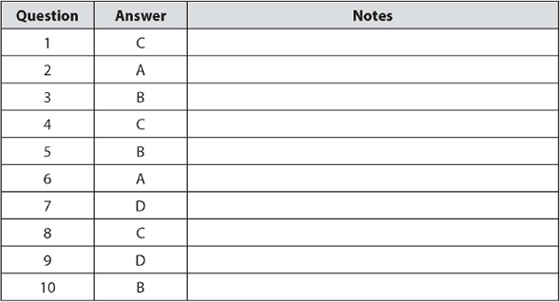
PART II
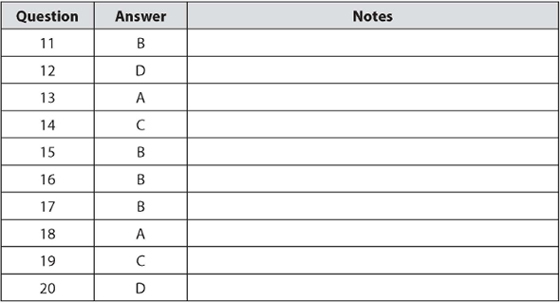
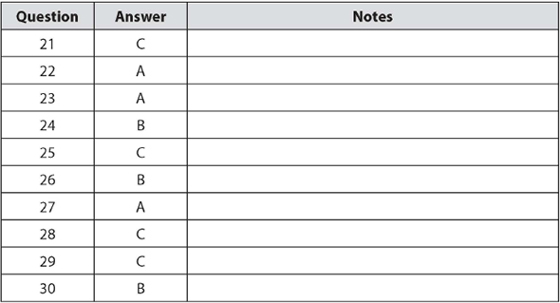
PART IV
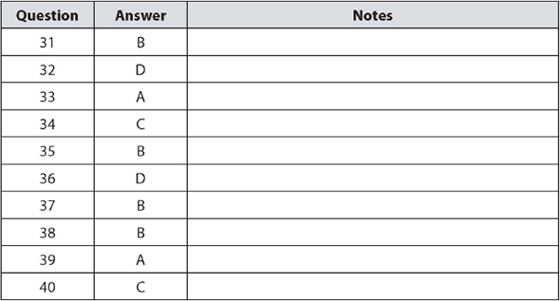
DETAILED ANSWERS—PRACTICE TEST 2
PART I
1. The way this question is set up, the opening phrase Skating past the last defender modifies my father, even though the author is the one who is playing hockey. This is a misplaced modifier, so answer choices (A) and (B) can be eliminated. Answer choices (C) and (D) correct this problem, but (D) is in the wrong tense. The simple past tense is correct, and thus the best answer is (C).
2. The sentence is correct as written, because the noun form Possession is a stronger subject than When you possess, and it agrees with the verb is. Also, answer choices (C) and (D) have improper sentence structure; in (C) the this and the comma are unnecessary, and (D) does not have a clear subject. The best answer is (A).
3. This question tests the proper use of pronouns. The two brothers are being compared, and as the sentence is written, the subject pronoun he does not agree with the object pronoun me. Therefore, answer choice (A) is incorrect. For similar reasons, you can eliminate answer choice (D). Answer choices (B) and (C) correct this error, but (C) includes the unnecessary possessive years’. The best answer is (B).
4. The opening phrase Despite my lingering fears refers to the author of the sentence, so the first noun after the comma should be I, not my son. Therefore, you can eliminate answer choices (A), (B), and (D). The best answer is (C).
5. The first issue in this sentence involves the punctuation involved in quotations. The two main points are that a comma should precede an opening quotation mark, and that the question mark should be within the closing quotation mark. Therefore, the best answer is (B).
6. This sentence is written correctly, because it maintains the present tense established by the opening phrase Whenever I go. It also uses the proper idiom remember … to. Answer choice (B) changes the verb to the past tense, (C) misuses the idiom, and (D) changes the verb to the past perfect tense. The best answer is (A).
7. Don’t be thrown by whether to use despite or in spite of, since the two are interchangeable. The real issue is the comparative colder climate; the sentence is incorrectly written because it should say than anywhere else. Otherwise, the climate would have to be colder than itself, which is impossible. Eliminate answer choices (A) and (C). Answer choice (B) is incorrect because colder needs than. The best answer is (D).
8. This question tests the proper use of the word however. As written, the sentence is a run-on, and a comma doesn’t solve the problem. Since the two clauses are independent (they could survive on their own as complete sentences), you need a semi-colon or a period to separate them. Therefore, the best answer is (C).
9. This sentence has two subjects (the product and the delivery), so a parallel construction requires that the sentence use the plural keys. After you eliminate answer choices (B) and (C), you can also get rid of answer choice (A) because the structure is not parallel; Having a product does not match the tense of to deliver. The best answer is (D).
10. This question is an example of the inverted sentence structure. When a sentence begins with a negative phrase like No sooner, you should use the past perfect had … ended. In addition, the auxiliary verb had must be placed in front of school, which is the subject of the sentence. Therefore, the best answer is (B).
PART II
11. The new sentence is: Once he had passed through the airline security station, Jeffrey ran for his gate. The construction once uses the past perfect tense, and the best answer is (B).
12. The new sentence is: Hawaii is a common destination for honeymooners because it is blessed with consistently pleasant weather. The other answer choices use an incorrect verb tense, so the best answer is (D).
13. The new sentence isn’t all that different from the original: The zookeepers were worried that the escaped cobra would bite them, so they were reluctant to enter the reptile house. The best answer is (A).
14. The new sentence is: Driving to his sister’s house, Paul listened to an audio book on his car stereo. There is no need to change the verb tense, so the best answer is (C).
15. This one can seem tricky, because you have to decide which noun appears first in the sentence. This new sentence reads: Despite signs that the economy is improving, housing prices continue to fall. Note that another possible construction is Despite signs of economic improvement, but that isn’t an option among the answer choices. The best answer is (B).
16. The new sentence is: He cannot play professional basketball because he is not taller. The best answer is (B).
17. The new sentence creates a new subject, Reaching, so the proper verb to go with it is is. The new sentence is: Reaching out beyond their political base is normal among political candidates when they announce their candidacy for president. The best answer is (B). (I know! Three B’s in a row. Weird, right?)
18. This is another often-used inversion structure, and your job is to switch the sentence around, like this: Never again will Americans suffer as much collective grief as they did the day John F. Kennedy was assassinated. The best answer is (A).
19. The new sentence starts with He waited many years to adopt a child because idiomatically, waiting goes with the preposition to. The best answer is (C).
20. The new sentence retains the comparison, but instead of comparing cities, the new sentence compares the actual process of doubling. The new sentence looks like this: As did many other new American cities, Atlanta doubled in size in only its first ten years of existence. The best answer is (D).
PART III
21. The last sentence of the passage mentions that “despite many attempts to create a standardized spoken Chinese language … provincial loyalties have scuttled the effort every time.” This is a nice paraphrase for “regional pride.” None of the other answer choices is mentioned, and the best answer is (C).
22. This is an inference question, so the key is to ask yourself what must be true. And we know that answer choice (A) is true, because if it weren’t Thomas would not have been eligible to receive the discounted tuition. We don’t know whether they needed to save the money; they could have chosen to. So answer choice (B) is out. We know nothing about answer choices (C) or (D), either. The best answer is (A).
23. This passage is chiefly concerned with listing a number of potential dangers in drinking water. Answer choice (B) is too strong, because even though we don’t know whether the problems can be solved, we do know people are looking to solve them. Answer choice (C) is too specific, as it only deals with the one sentence about pregnant women. And answer choice (D) is too strong, because there is no advocacy involved. The best answer is (A).
24. The passage says that “theory of a static universe persisted centuries after Newton’s death,” indicating that he lived long before the “discovery that the universe is constantly expanding” in the 20th century. The author therefore mentions Newton to indicate that he could have come up with the idea long before it actually came to pass. The best answer is (B).
25. Answer choices (A), (B), and (D) are too extreme, because they mention feelings that just don’t appear in the passage. We don’t know if dogs and cats hate each other, or which, if any, the author prefers. The passage is merely a neutral list of ways in which dogs and cats are different, and the best answer is (C).
26. Answer choice (A) is too narrow, because even though the passage states that “the most striking features of jazz originate directly from the blues,” that isn’t the subject of the whole passage. The author never compares the influencing styles. And although lots of musical instruments are mentioned, nothing about their versatility is mentioned. The best answer is (B).
27. This is another tricky inference question. The passage says that “individuals in rural areas have greater purchasing power than those living in urban or suburban regions,” mainly because “the money spent by urban and suburban dwellers on their fundamental need for food and shelter could be spent by rural households on discretionary items.” That is a long and complicated way of saying that rural dwellers pay less for food and shelter. The best answer is (A).
28. In the passage, the conjecture (another word for “theory”) is that “ice ages resulted from variations in the Earth’s orbit.” And now there is a new way to test this chronology, using those two oxygen isotopes. There is no debate or controversy over the theory, so answer choices (A) and (D) are out. Although there wasn’t enough information initially, the author’s point is that there is now. The best answer is (C).
29. This passage is about a revised definition of “intuition,” which is “a very specific impulse sharpened by years of experience and practice.” They specifically do not adhere to strict regimens of anything, so you can get rid of answer choice (A). Answer choice (B) is never mentioned, and answer choice (D) is irrelevant. The best answer is (C).
30. In this case, the theory that the author mentions is “widely assumed”—which means the same things as “widely accepted”—and the author wants to challenge it. The author doesn’t mention any data that he perceives to be irrelevant. The theory has not been discarded, unjustly or otherwise, so you can eliminate answer choice (C). And although the conclusion is new, the data source is not. So you can get rid of (D) as well. The best answer is (B).
PART IV
31. The first sentence says it’s a good time to buy a home because prices are low, but the second states the opposite (or undermines it) by saying the tax you’ll pay on that new house is higher than ever. The best answer is (B).
32. Given the first sentence’s claim that gas prices are rising, you might expect gas consumption to go down. The assertion that it, too, is increasing is unexpected. The best answer is (D).
33. The first sentence states evidence that butter is bad for you, yet the second statement says Koreans have the same problems and eat hardly any butter at all—implying that maybe the heart problems are caused by something else. The two statements contradict each other and the best answer is (A).
34. In the first sentence, we learn that it is unlikely that voters will support a new stadium, and the second sentence tells us what might happen if the stadium is not built. The second sentence is a potential consequence of the first, and the best answer is (C).
35. In the first sentence, health advocates express worry that a growth hormone used on livestock is unsafe for humans. The second aims to soothe those worries by saying the dosage is too small for humans to be affected. The best answer is (B).
36. The first sentence states a fact, that more people are working out indoors. The second tries to explain that fact by saying the weather outside is terrible. The best answer is (D).
37. The first sentence says that glaucoma affects people over 50, and it makes sense that the disease will be a bigger problem if there are more 50-year-olds in the world. The second statement supports the first with extra evidence, and the best answer is (B).
38. The first statement is a theory that Americans do not reveal all of their income on their income tax returns, and the second sentence supports that theory by providing evidence of one particular person doing just that. The best answer is (B).
39. The first statement talks about children over 17 and movies, whereas the second talks about kids that are under 17 and television. The second does not address anything specific; it especially doesn’t say that the first sentence is false. The best answer is (A).
40. The first sentence describes a contentious topic (with the “unpopular” bill), and in the second the governor attempts to explain why that bill was introduced. The best answer is (C).
Here is a sample response to the essay question:
I agree with the notion that “the people we remember best are the ones who break the rules.” Ten people doing what is expected is boring and expected, but that 11th person who is flouting the rules is immediately interesting. I can think of three reasons why I believe this.
In a society based on rules, most of us live within them—either because of a moral desire to do right or a fear of punishment for doing wrong. When we encounter people who have dared to stand in the face of the law, with less regard for the consequences, we often envy their bravery for doing something we cannot. Many times, we can find ourselves living vicariously through another person’s exploits that are, statistically, outside the norm.
This is why in movies, for example, the most memorable parts are often of the villains, rather than the heroes. Eliot Ness may have championed the law in a lawless town, but it was Al Capone, his nemesis, whose name so often made the national headlines. When we think of The Silence of the Lambs and The Dark Knight, two movies that earned many favorable reviews and hundreds of millions in revenue, we think less about the heroes than we do about Hannibal Lecter and the Joker. Not coincidentally, the actors who played those roles, Anthony Hopkins and Heath Ledger, earned an Oscar.
On a different note, we also remember people who break the rules because they are the ones mostly likely to come up with something radically new. Bill Gates wasn’t deriving value from his studies at Harvard, so he dropped out, formed a software company called Microsoft with his friend Paul Allen, and is now one of the wealthiest men on Earth. Perhaps inspired by this pattern, Mark Zuckerberg did the same thing 30 years later, dropping out of Harvard to start Facebook. And now, he is the world’s youngest billionaire.
A society that embraces conformity needs its standouts, those particular people who inspire us to think beyond the accepted and challenge the perception of what is truly possible. Rules mean conformity, and although we need rules to function as a society, we need people to challenge them, bend them, and sometimes break them in order to innovate. Doing so successfully will keep you remembered throughout history, whether you’re a criminal or an entrepreneur.